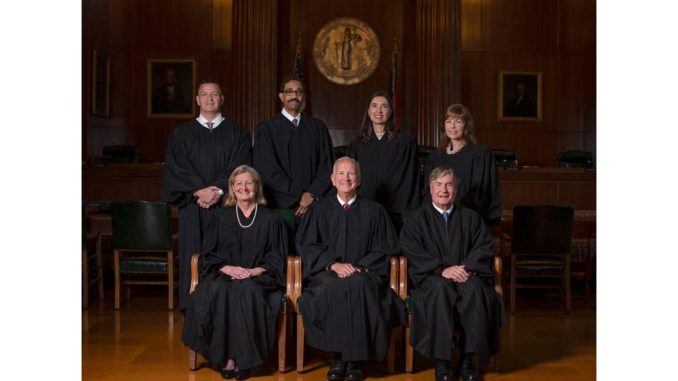
RALEIGH — The N.C. Supreme Court released its opinion on the long-running Leandro education funding case on Nov. 4, just days ahead of the 2022 midterm elections.
In the 4-3 decision, the Democratic majority sided with former Judge David Lee’s previous decision ordering three state entities — the state controller, state treasurer and the N.C. Office of Budget and Management — to transfer billions from the state’s coffers.
Penned by retiring Associate Justice Robin Hudson, the majority opinion consists of 136 pages out of the 227-page ruling. Hudson’s majority ruling also says the trial court will “retain jurisdiction over the parties to monitor State compliance with this order.”
The bulk of the majority opinion is spent justifying what Hudson calls an “extraordinary remedy,” which is the court bypassing the state constitution’s appropriations clause that states “No money shall be drawn from the State treasury but in consequence of appropriations made by law.”
“We recognize that the remedy decreed by the trial court’s November 2021 Order and reinstated by this Court today is extraordinary,” Hudson wrote. “It exercises powers at the outer bounds of the reach of the judiciary and encroaches into the traditional responsibilities of our coequal branches of government. We do not do so lightly.”
Hudson went on to write “years of continued judicial deference and legislative non-compliance render it our solemn constitutional duty to do so” and that to retain constitutional integrity, “the judiciary must fill the void.”
In an interview with North State Journal, North Carolina Institute for Constitutional Law President Jeanette Doran said Hudson’s characterization of the ruling as an “extraordinary” remedy was likely an “attempt to make the decision sound narrower than it is” and it would make voters “more comfortable with this power grab.”
“The public knows,” Doran said. “The appropriations clause is not difficult to understand.”
She added that Hudson and the other three justices in the majority perhaps thought voters weren’t going to “get it,” however, “in their gut, voters know they don’t want judges writing portions of the state budget.”
Doran’s observation on voter comprehension of the issue could be one of the reasons the two Republican candidates for the high court won their races on Nov. 8, giving the GOP majority control for the first time since 2018.
State Controller Linda Combs has already objected once over due process rights and her office being directed to make part of the transfer order, and State Treasurer Dale Folwell has obtained outside legal counsel regarding the case. It is unclear at this point how those two officials will proceed.
Doran noted that Hudson barely mentions due process, spending “about three sentences” on the topic, and summarized Hudson’s due process argument as “we don’t see a due process issue here because other parts of the state were involved in the case and they adequately represented [Combs’] interests.”
When the three agencies were ordered to make the transfers, the dollar figure was more than $1.7 billion and would be distributed to the N.C. Department of Health and Human Services, the N.C. Department of Public Instruction and the UNC System.
The amount was reduced in light of recent budgets down to about $750 million, but that number could change again. Hudson’s ruling remands the case back to the trial court for the “narrow purpose of recalculating the amount of funds to be transferred in light of the State’s 2022 budget.”
For context, the original price tag of the 300-page Comprehensive Remedial Plan compiled by the consulting group WestEd was a staggering $8.29 billion in vague new state-level spending over an eight-year period.
The dissent was authored by Associate Justice Phil Berger Jr. and joined by Chief Justice Paul Newby and Associate Justice Tamara Barringer.
Most of the dissent centers on the state constitution’s appropriations clause and, in part, refutes the majority opinion as “the arbitrary usurpation of purely legislative power by four justices.”
Citing multiple past cases, Berger underscored the majority’s opinion undermines the court’s own past rulings, one of which occurred around two years ago — the case of Cooper v. Moore. Writing for the majority, Associate Justice Sam Ervin affirmed the General Assembly has “exclusive” control of expenditures under the state’s appropriation clause.
“In light of this constitutional provision, ‘[t]he power of the purse is the exclusive prerogative of the General Assembly,’ with the origin of the appropriations clause dating back to the time that the original state constitution was ratified in 1776,” Ervin wrote.
In the end, Berger cut to the chase, stating the case isn’t about money but about “power.”
“Fundamentally, and contrary to what plaintiffs, executive branch defendants, and the majority would have the public believe, this case is not about North Carolina’s failure to afford its children with the opportunity to receive a sound basic education,” wrote Berger. “The essence of this case is power — who has the power to craft educational policy and who has the authority to fund that policy.”
Berger heavily criticized the majority opinion as a “gross misapplication” of case law, as well as an “Oppenheimeresque reshaping of the appropriations clause and usurpation of legislative function” that has “no apparent concern for constitutional strictures or the limits of this Court’s power.”
“The judicial branch now assumes boundless inherent authority to reach any desired result, ignoring the express boundaries set by the explicit language of our constitution and this Court’s precedent,” Berger wrote.
Berger also pointed out the majority admits “Leandro II was limited to Hoke County, but because the trial court hear and made references to other districts, Leandro is now a ‘statewide’ case.”
Part of Berger’s dissent echoed the argument of the legislative defendants that there was collusion in the case, stating “Plaintiffs, Plaintiff-Intervenors, and [the State] have worked together to obtain judicial orders mandating their desired policies.”
Lending support to the collusion claim lies is the fact at least $1.5 million of the $2.05 million paid to WestEd came from entities friendly to the governor’s office. Out of the $1.5 million, a combined $804,699 came from two Cooper’s cabinet agencies; the Department of Administration and the N.C. Department of Health and Human Services.
Berger also addressed Attorney General Josh Stein’s recusal.
“In 2011, the majority party of General Assembly, both House and Senate, changed. The Attorney General, then asserting a purported conflict of interest, ceased to represent the General Assembly at that time,” Berger wrote. “The Attorney General noted that executive branch defendants refused to waive this conflict.”
Stein’s statement on the ruling thanked his team for their “impressive work arguing this case” and that he had “long said that we need a good teacher in every classroom and a strong principal in every school,” and was “grateful that the Court agrees.”
Democratic Gov. Roy Cooper issued a two-sentence statement about the ruling that said, “It’s our constitutional duty to ensure every child has access to a sound basic education. As the N.C. Supreme Court has affirmed today, we must do more for our students all across North Carolina.”




